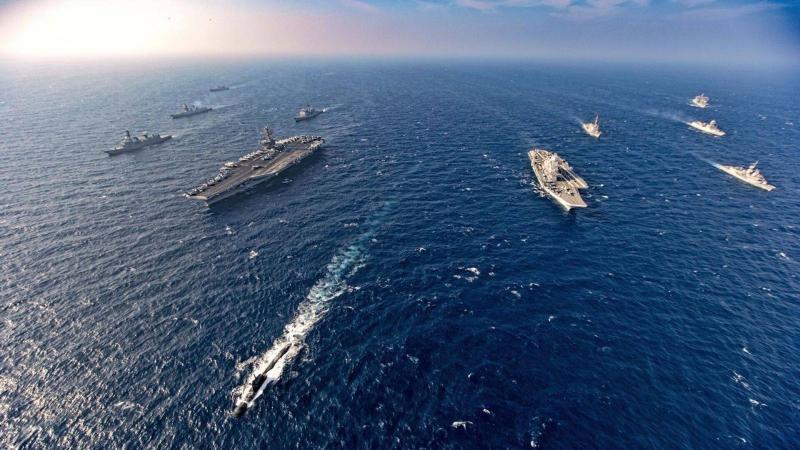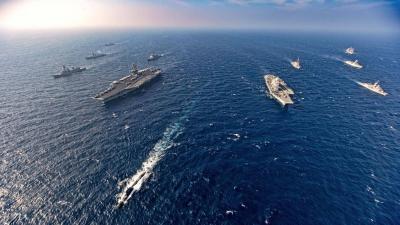The Red Sea region has been a target for major powers for decades due to its exceptional geographic location. These powers have sought to invest politically and militarily by establishing military bases to protect their vessels from piracy, safeguard international trade, and secure oil tankers. For a long time, it has been one of the most important international passages, connecting East to West. On its shores, major colonial attempts have failed, the most famous being Napoleon's invasion of Egypt in 1798. This later renewed the idea of the imagined canal from the time of the Pharaohs into reality under Jean-Baptiste La Marck, leading to the opening of the Suez Canal in 1867. The British, French, and Italians shared control until the project disintegrated after World War I. Subsequently, maritime routes in the Middle East saw a resurgence, especially after the Suez Canal gained prominence over the Cape of Good Hope in commercial operations. The significant rise came with the discovery of oil and the development of Saudi Arabia and the Gulf region, making it a key artery for global trade.
In response to Western efforts, Turkey and Iran also pursued expansionist projects, attempting to enter the Red Sea through Somalia and Sudan, along with an ideological backing by Tehran for the Houthis. This was complicated by the international community's failure to address the serious warnings from Saudi Arabia, which has repeatedly urged for acknowledgment of its perspectives on Gulf and regional security and the challenges created by international neglect.
Today, international forces are attempting, according to reports in the Middle East, to replicate misguided approaches to tackle the more dangerous dilemma of Red Sea security. Current negligence is exacerbated by Israeli violations in Gaza, which the Houthis use as a pretext to escalate a larger crisis related to Iran and the management of arenas, seeking to rally support for negotiation and popular leverage. This situation cannot be resolved without a strategy for the maritime national security concept for the relevant countries, particularly Saudi Arabia, as it is primarily concerned with Red Sea security more than other bordering nations, holding the most significant portion of the coastline. This area is crucial, accounting for 12% of global trade and 40% of trade between Asia and Europe, alongside the historical and geographical significance of Saudi ports, especially Jeddah, which played a fundamental role in the early Islamic period in shaping the relationship between the holy cities and the world.
Currently, there are dangerous unilateral approaches that need substantial revisions due to the impact of piracy by Houthi militias. Despite the new European Union maritime mission in the Red Sea attempting to address the repercussions and challenges arising from instability and stating its intention to coordinate with key players in the region, the launch of the "Aspides" force seems isolated and politically skewed, lacking attempts to address regional crises, including the severe Israeli aggression on Gaza, which may exacerbate the crisis, particularly along with the Houthis' sporadic rapid strikes or merely remaining in defensive positions without a long-term security strategy anchored on Saudi Arabia's pivotal role as the most influential and active player in the region.
Creating a security consensus regarding the Red Sea is impossible amid ethical and political divisions over the aggression against Gaza and the deepening stalemate on any solution that seeks to broaden perspectives and shift approaches from reactive measures to strategies about a fundamental question: What is the future of Gaza, the Palestinian cause, and the pending security files in the region?
The strategy for Red Sea security is primarily a regional matter reflecting the balance of power among the bordering nations, with Saudi Arabia, Egypt, and Jordan at the forefront, taking into consideration the broader perspective of the Yemeni crisis related to permanent resolution discussions, which transcend the issue of the Houthis.
Interest in the Red Sea's security within Saudi Arabia's security strategy is not new; the importance of this issue was recognized early on, dating back 67 years to 1956 when Saudi Arabia established the "Jeddah Charter" to create a joint security system in the Red Sea. Subsequent agreements followed with bordering nations, and Saudi Arabia has intervened vigorously at various times during crises connected to the Red Sea or expansionist ambitions and projects, including the Ethiopian-Eritrean conflict and Israeli, Turkish, and Iranian movements, each according to their ability to influence countries in the Horn of Africa and get involved in their internal conflicts.
Red Sea security is a significant and complex issue that cannot be addressed through mere reactions due to the intertwining of interests and international influence. Coordinating with key players is essential, as any superficial or risky approaches will deepen the crisis. Listening to Riyadh today is urgent, particularly with its ambitious and comprehensive vision led by Crown Prince Mohammed bin Salman, capable of crafting maritime diplomacy and a geopolitical approach that can manage these crises based on vision and strategy, rather than hasty and unrefined reactions that may have adverse consequences.




